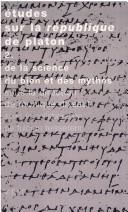| Listing 1 - 3 of 3 |
Sort by
|
Book
ISBN: 1472552229 1472501667 9781472501660 9780715639207 071563920X Year: 2011 Publisher: London Bristol Classical Press
Abstract | Keywords | Export | Availability | Bookmark
 Loading...
Loading...Choose an application
- Reference Manager
- EndNote
- RefWorks (Direct export to RefWorks)
"This is the first complete translation into a modern language of the first part of the pagan Neoplatonist Simplicius of Cilicia's commentary on Aristotle's argument that the world neither came to be nor will perish. It is notable and unusual among the commentaries because Simplicius includes in his discussion lengthy representations of the Christian John Philoponus' criticisms of Aristotle along with his own, frequently heavily sarcastic, responses."--Bloomsbury Publishing One of the arguments in Aristotle's On the Heavens propounds that the world neither came to be nor will perish. This volume contains the pagan Neoplatonist Simplicius of Cilicia's commentary on the first part of this this important work. The commentary is notable and unusual because Simplicius includes in his discussion lengthy representations of the Christian John Philoponus' criticisms of Aristotle along with his own, frequently sarcastic, responses. This is the first complete translation into a modern language of Simplicius' commentary, and is accompanied by a detailed introduction, extensive explanatory notes and a bibliography.
Astronomy, Ancient. --- Cosmology, Ancient. --- Astronomy, Greek --- Cosmology --- Greek astronomy --- Ancient cosmology --- Ancient astronomy --- Aristotle. --- Astronomy, Greek. --- Cosmology. --- Astronomy --- Deism --- Metaphysics
Book
ISBN: 1472552237 1472501705 9781472501707 9780715640630 0715640631 9781472552235 9781472500861 1472500865 Year: 2011 Publisher: London Bristol Classical Press
Abstract | Keywords | Export | Availability | Bookmark
 Loading...
Loading...Choose an application
- Reference Manager
- EndNote
- RefWorks (Direct export to RefWorks)
"This is the first English translation of Simplicius "responses to Philoponus" Against Aristotle on the Eternity of the World. The commentary is published in two volumes: Ian Mueller's previous book in the series, Simplicius: On Aristotle On the Heavens 1.2-3, and this book on 1.3-4. Philoponus, the Christian, had argued that Aristotle' arguments do not succeed. For all they show to the contrary, Christianity may be right that the heavens were brought into existence by the only divine being and one moment in time, and will cease to exist at some future moment. Simplicius upholds the pagan view that the heavens are eternal and divine, and argues that their eternity is shown by their astronomical movements coupled with certain principles of Aristotle. Until the launch of this series, the 15,000 volumes of the ancient Greek commentators on Aristotle constituted the largest corpus of Greek philosophical writings which had not been translated into English or other European languages. There are now over 100 volumes in the series."--Bloomsbury Publishing This is the first English translation of Simplicius' responses to Philoponus' Against Aristotle on the Eternity of the World. The commentary is published in two volumes: Ian Mueller's previous book in the series, Simplicius: On Aristotle On the Heavens 1.2-3, and this book on 1.3-4. Philoponus, the Christian, had argued that Aristotle's arguments do not succeed. For all they show to the contrary, Christianity may be right that the heavens were brought into existence by the only divine being and one moment in time, and will cease to exist at some future moment. Simplicius upholds the pagan view that the heavens are eternal and divine, and argues that their eternity is shown by their astronomical movements coupled with certain principles of Aristotle. The English translation in this volume is accompanied by a detailed introduction, extensive commentary notes and a bibliography.
Astronomy, Ancient. --- Cosmology, Ancient. --- Astronomy, Greek --- Cosmology --- Greek astronomy --- Ancient cosmology --- Ancient astronomy --- Aristotle.


ISBN: 2345001747 2711618161 Year: 2021 Publisher: Paris : Vrin,
Abstract | Keywords | Export | Availability | Bookmark
 Loading...
Loading...Choose an application
- Reference Manager
- EndNote
- RefWorks (Direct export to RefWorks)
« Même si elle tient à la fois de la poésie et du sermon, la République est avant tout un livre de philosophie. » Et Nettleship, un de ses plus grands interprètes, énonçait en conséquence ce principe de lecture : il faut voir comment Platon arrive à ses conclusions avant de commencer à les critiquer. Pour les critiques, elles n’ont jamais manqué, que ce soit envers la nature utopique ou totalitaire qu’on reconnaît à l’œuvre, ou à l’égard de thèses métaphysiques ou politiques jugées exorbitantes, tel ce mystérieux « bien par delà l’essence » ou celle du gouvernement des philosophes. Ce second volume a pour objet les principes dégagés par les livres centraux, fondements nécessaires des conséquences psychologiques et politiques tirées dans les autres livres. La définition du philosophe authenthique, seul apte à saisir le Bien par la science qui lui est propre, permet de constituer en paroles une cité ayant pour modèle l’Idée même de justice et de définir comme une conversion totale de l’âme l’éducation de ceux qui sont destinés à la garder et à la gouverner. Enfin, si c’est dans la République que la plus haute science, la dialectique, se trouve déterminée par le fait de n’avoir pas recours à des images, l’œuvre abonde en comparaisons, allégories, analogies et mythes en tous genres. Nouer ainsi la science au mythe, c’est sans doute aussi réfléchir à une des manières dont la philosophie doit pénétrer la politique.
Classics --- Philosophy --- politique --- mythe --- science --- République --- bien --- dialectique
| Listing 1 - 3 of 3 |
Sort by
|

 Search
Search Feedback
Feedback About
About Help
Help News
News